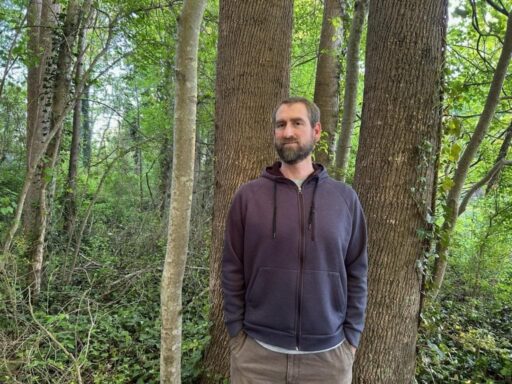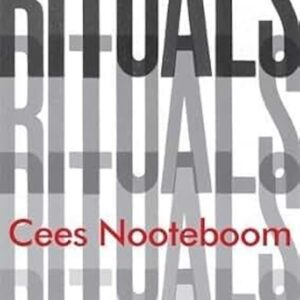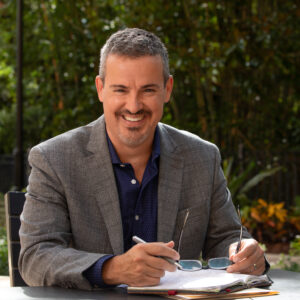We recently spoke with author Derek Updegraff about his new Slant novel, Whole.
The narrator of Whole is a writer. Did you pull experiences from your own early ambitions to pursue a life of writing? Do you rely on personal experience in your writing, or is it mostly invention?
I think moments from my own life always find their way into my fiction, but certainly this novel and my earlier short stories blend both personal experience and invention. That’s typical for most writers I know and have read about. The narrator, Joe, began as a character similar to me, but so did his girlfriend Ashley. I suppose they both mirror basic aspects of my life. Like Joe, I worked in a café during college and did spontaneous things like ride buses around town to observe people and get ideas for characters. And like Ashley, I ended up getting an MFA and a PhD and becoming a professor. They share the same birthday—April 23—which is also my birthday, so I was intentional there in having those two represent parts of me. Ashley is the ambitious one, not Joe, and I relate both to his easy-going, lackadaisical approach to the writing life—to his disregard for success or even basic recognition—and also to Ashley’s drive, her desire to advance professionally as a professor and as a writer. But their similarities to me and my life stop at the surface. Once I got to know them better as characters, they needed their own backstories and they needed to act in ways I wouldn’t. Especially Joe. His traumas are not mine. With each revision, I pushed him to be more unsettling, and his final action came about late in the drafting process. The culminating scene exists only because Joe moved far away from the initial likeness we shared. I suspect readers will root for him but be disturbed by him, and I hope he receives sympathy despite his faults.
Perhaps the most substantial borrowings from real life include Ronnie and the dog park. And all the Inland Empire and southern California cities the characters visit. And the Mission Inn, which is a remarkable place. Ronnie is based on a person I used to chat with at the same dog park in the novel. He lived in a tent near the Santa Ana River—perhaps he still does—and he would often walk up to the park with his dog and fill up jugs of water. And even when he didn’t need water, he would socialize there, letting his old brute of a dog run the place while he remained aloof and found someone to talk to. That person was often me, and I was lucky my two dogs were big and didn’t get picked on by his dog. I never ran him over with my car, but I would see him riding his bike around town. That was the starting point to the story. The real Ronnie—who has a different name of course—and the setting of the dog park, which seemed like a great environment to write about.
It sounds like you began the novel with two of your main characters in mind—Ronnie and Joe—and the dog park as a backdrop. How important is place to your writing? And do you typically begin a story with character or setting or both?
Place is always important to me. I don’t like reading stories that feel ungrounded. If I have a character in mind for a story, then I immediately turn my attention to setting. I know conflict will come, so I don’t worry about that as much as character or place. And often I start with the setting. I have stories set in a laundromat, the kitchen of a restaurant, a hiking trail, the ocean, even Disneyland—places I’m familiar with that for whatever reason speak to me as being great starting points for a story. When I’m brainstorming in a new writing session, often I just type out all the environments I’m familiar with and see if there’s a place begging to have a few characters dropped in. When I was new to Riverside and started going to that dog park, I recognized it was a great setting. Then came the character of Ronnie, which necessitated Joe, and then came Ashley to add a new plotline. And her being a writer eventually turned Joe into a writer too, and then Cora came along as the last significant character. But when I was drafting with Ronnie and Joe and the dog park as the only pillars, the piece was supposed to be a short story, and its original title was “Shelter.” I was finishing my second book of short stories, and “Shelter” was supposed to be the final story in the collection. It was probably 10,000 words, and I tried to convince myself it was done, but I knew it wanted to be longer. When it broke 20,000 words, I pulled it from the collection because I realized it needed to be a stand-alone novella or novel. This was probably in 2018. The collection I’d intended it to be in was published in 2020. Now it’s 2024, and “Shelter” gradually became Whole, which is 50,000 words. Short for a novel, I know, but long for me since my previous books are collections of poems and short stories.
So this novel began as a short story. What are your thoughts about the differences in those forms? And is the planning and writing process similar?
I’m not sure I’m the best person to answer this. I feel like I’m a short-story writer who stumbled his way into a novel. Don’t get me wrong. I’m really proud of this novel, and I hope people read it and like it, but I didn’t have what I imagine is the typical path of chapter planning and outlining that most novelists do. One of the reasons I love the form of the short story is that I like to write stories that cover small amounts of time, like a single afternoon, so the short form obviously lends itself well to that. Whole covers only a few months, but I had never written a story that covered that much time, so the experience of fast-forwarding past days or weeks to get to the next scene was new to me. In a short story, nothing can be wasted. Every little thing must contribute. Ideally in a novel that’s true too, but with more space comes more opportunity to drag on a scene or description and to hide weaker moments among the good stuff. I hope everything in my novel is needed. I think it is. Joe writes stand-alone stories that I trimmed and trimmed so that every sentence and word felt necessary. I did that for each chapter in the main narrative too, reading aloud every paragraph again and again to make sure the writing was concise and whatever details remained were contributing to plot or characterization meaningfully.
In addition to reading your drafts out loud, do you have other practices you do consistently in your writing process?
It’s funny, but that might be the most consistent practice I have. I suspect poets are generally better than prose writers at reading aloud their pieces before they submit them to journals. I tell my fiction students that when they think they’re done with a story, they need to read it aloud to themselves in its entirety and be happy with every sound. I tell them they might want to draft that way too, pausing to read aloud each new paragraph. I tend to write slowly, and I read that way too. Language—its words, its sounds, its structures—is too fascinating to me to speedread through, but I get that some writers need to move quickly through a first draft, racing to the end with the intention of fleshing things out in revision. All writers need to find what works for them in terms of process. But yes, I’m an advocate for focusing on sound and rhythm in the later drafting stages. Other than that, my writing process is probably pretty typical. I print out nearly-finished drafts and read them slowly with a pencil in hand. I cut words to make sentences sharper. I cut whole sentences, sometimes paragraphs. I write in new sentences, new paragraphs. I type in the revisions, print the thing out, and go at the newest draft with my pencil again, rereading from start to end. I’ll do this for however many days, weeks, or months are necessary before I send a story out to a journal.
You’ve written a novel now. What’s next? More short stories? More poems? Or will you start work on a second novel now that you’ve tackled your first?
Since finishing Whole, I’ve been working on my third collection of short stories. Some of the stories are finished, and I have notes for others. But I do think one idea I’m playing around with is better suited for a novel, so I’m excited to start a novel on purpose this next time.





